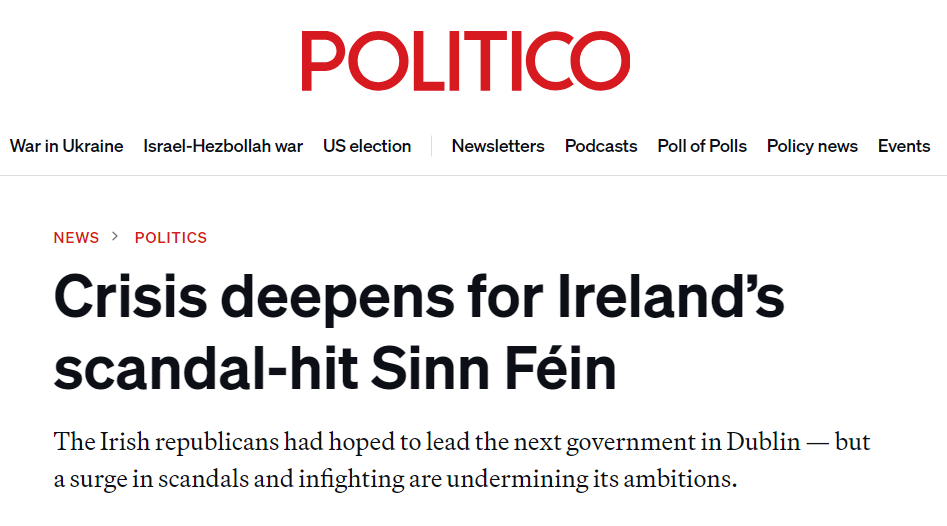
Crisis deepens for Ireland’s scandal-hit Sinn Féin

The crisis is raising serious questions about the political survival of Mary Lou McDonald, the Dubliner handpicked by Sinn Féin’s previous leader, Gerry Adams. | Charles McQuillan/Getty Images
Ever since drawing level with Ireland’s governing center-ground parties at the last general election in 2020, Sinn Féin had confidently billed McDonald as the nation’s prime minister in waiting. But that confidence, already shaken by poor results in other elections this summer, has evaporated amid a barrage of self-inflicted wounds.
McDonald spent Tuesday afternoon in Dáil Éireann, Ireland’s key lower house of parliament, mounting a defense of Sinn Féin’s handling of two scandals and a pair of surprise resignations. But her explanations left key questions unanswered and spurred new accusations that she had deliberately misled parliament about how much she knew, and when.
The widening scope of the debate illustrated just how quickly Sinn Féin’s internal problems have multiplied. When the government of Prime Minister Simon Harris sought to use the debate last week as a vehicle for attacking Sinn Féin, only one of the four controversies was out in the open.
There’s so much to unpack.
Reputational damage
Initially, McDonald’s Dublin headquarters sought to confine the reputational damage to Sinn Féin’s operations across the border in Northern Ireland, the party’s traditional U.K. power base, where it already leads a cross-community government under First Minister Michelle O’Neill, Sinn Féin’s deputy leader. It was there that the first scandal surfaced last month, when the party’s former press officer Michael McMonagle pleaded guilty to 14 counts of soliciting sex with children.
McMonagle had spent eight years working in various Sinn Féin roles at Stormont, the seat of Northern Ireland’s devolved government, including within the legislative office of O’Neill in 2020.
Sinn Féin officials had known about the police investigation into McMonagle’s behavior for three years. He was quietly fired — but two party colleagues, including Sinn Fein’s top spin doctor at Stormont, wrote him letters of recommendation to land a new gig at an unwitting charity, the British Heart Foundation.
When journalists started asking questions after McMonagle’s guilty plea and got wind of the recommendations, Sinn Féin pushed both letter writers to resign, denied any knowledge at the top that the party had recommended McMonagle, and accused the British Heart Foundation of failing to conduct due diligence.
O’Neill faced a Stormont grilling over the affair. She apologized to the British Heart Foundation — but struggled to explain how she couldn’t have known about McMonagle’s new job, given she was pictured standing in front of him at a Stormont event last year. O’Neill insisted she never noticed him.

First Minister Michelle O’Neill, Sinn Féin’s deputy leader, faced a Stormont grilling over the Michael McMonagle affair. | Charles McQuillan/Getty Images
Although Sinn Féin is the only party contesting elections in both parts of Ireland, its Dublin and Belfast operations are largely partitioned — and McDonald had hoped, for damage-limitation purposes, to keep it that way.
She stayed silent on McMonagle until the eve of O’Neill’s Stormont questioning, then announced a root-and-branch review of Sinn Féin’s internal structures under a newly appointed general secretary.
“There must always be accountability for wrongdoing,” McDonald vowed. “I am committed to ensuring that an incident like this is never repeated again.”
Losing control of the narrative
That bid to take back control of the narrative didn’t survive the weekend.
In Kildare, a commuter county southwest of Dublin, Sinn Féin lawmaker Patricia Ryan announced she was quitting Sinn Féin and would run against the party as an independent.
She accused backroom party managers of vetting her social media posts, suppressing her constituents’ views on a local encampment of asylum seekers, and trying to block critical questions from the floor when McDonald paid her Kildare constituency a visit. At least 10 local members, including the party chair and secretary, joined Ryan in resigning.
While Sinn Féin was still knocking down Ryan’s accusations, a bigger figure took aim at the party as he too quit in bitterly disputed circumstances.
Brian Stanley was one of Sinn Féin’s most high-profile lawmakers in his role as chair of the most powerful parliamentary committee, Public Accounts, which pursues waste and wrongdoing in state-funded bodies. He accused Sinn Féin chiefs of scheming to ruin his good name in a “kangaroo court” designed to prevent him from standing for re-election.
Hours after Stanley’s resignation Saturday afternoon, Sinn Féin said it had referred evidence of wrongdoing against Stanley to Ireland’s national police force. Since then each side has dared the other to explain, in public, what exactly Stanley has been accused of.
“Brian is obviously in a difficult spot. He is lashing out,” said Pearse Doherty, Sinn Féin’s shadow finance minister. “We have not put the details of the complaint into the public record. It is for Brian to come forward and to be transparent if he so wishes.”
Posing a challenge
McDonald offered vague details in her parliamentary defense of Sinn Féin’s performance, saying a woman had complained of ill treatment by Stanley in October 2023 that had left her feeling “traumatized and distressed.” She insisted that Sinn Féin had nonetheless been right to leave Stanley in charge of the Public Accounts Committee until Monday, when he was sacked as chair.
Since his resignation, Stanley has refused all interview requests, instead issuing a string of statements through a lawyer accusing McDonald of abusing parliamentary privilege to smear him following “days of inaccurate statements and insinuations from Sinn Féin, along with selective briefings delivered with the clear intention of damaging my reputation and to shift the spotlight off the party.”

Niall Ó Donnghaile shut down his social media pages Tuesday after admitting he’d pestered a 17-year-old boy by text after the two went canvassing for Sinn Féin votes. | Charles McQuillan/Getty Images
Stanley, too, has vowed to run against Sinn Féin as an independent in the midlands county of Laois, where the party currently has only one other elected official, sitting on the local council — Stanley’s wife.
The biggest damage to McDonald may have come during Tuesday’s Dáil debate, when the identity of a sex pest texter in Sinn Féin ranks was finally revealed — and it emerged McDonald herself had given the transgressor a salutary sendoff.
Niall Ó Donnghaile, a former mayor of Belfast, was Sinn Féin’s leader in Ireland’s upper house of parliament, the Seanad, until December 2023 — when McDonald issued a press statement praising his work record and wishing the 39-year-old success in battling unspecified “health challenges.”
Sinn Féin has now deleted that statement from its platforms, just as Ó Donnghaile shut down his social media pages Tuesday after admitting he’d pestered a 17-year-old boy by text after the two went canvassing for Sinn Féin votes.
The teenager had complained to Sinn Féin about messages McDonald described as “unwanted and inappropriate.” This was the real reason Ó Donnghaile had resigned, she admitted during the debate.
Defending the indefensible
The Sinn Féin boss defended the decision to stand by him by claiming there were concerns about Ó Donnghaile’s mental health, suggesting he was a suicide risk.
The government and other opposition leaders argued that McDonald shouldn’t have put out a cover story for his political exit. They noted that as with all the other problems, Sinn Féin had only come clean once journalists began investigating or resigning lawmakers cried foul.
Foreign Minister Micheál Martin, leader of the other major party in Ireland’s coalition government, Fianna Fáil, accused McDonald of deliberately misleading parliament — an act that, in government, would merit her resignation.
“The party’s track record of concealment and secrecy is shocking,” he said, listing three earlier cover-ups, including the child rape committed by Gerry Adams’ brother Liam, who died in prison in 2013.
“It is clear Sinn Féin again failed to tell the truth on a very serious matter and seem to have been involved in a very elaborate cover-up,” said Martin, who officially wants the government to run its full five-year term through March but has already had his election posters printed.
The government parties appear in strong position to capitalize on Sinn Féin’s five-year low in opinion polls in the Republic of Ireland.
POLITICO’s Poll of Polls puts Sinn Féin level with Martin’s Fianna Fáil on 19 percent, while Harris’ energized Fine Gael leads on 25 percent. McDonald’s personal approval ratings are slumping and double digits below Harris and Martin, too.
On the campaign trail, Sinn Féin wants to be talking about its key vote-winning issue: the prohibitive cost and scarcity of housing in a country that ranks as among the most expensive places to live in Europe.
But analysts say the party will struggle to pull the focus away from its own internal strife and secrecy — and an impression that it’s not fit to rule.
“This has added fuel to what is going to be a ferociously fought general election,” said Gary Murphy, politics professor at Dublin City University. “The government parties will say: ‘well, you can’t even get your own house in order. How can we expect you to get the government house in order?’”
“If the general election is called soon, which it might well be, Sinn Féin will go into it on the back foot.”










